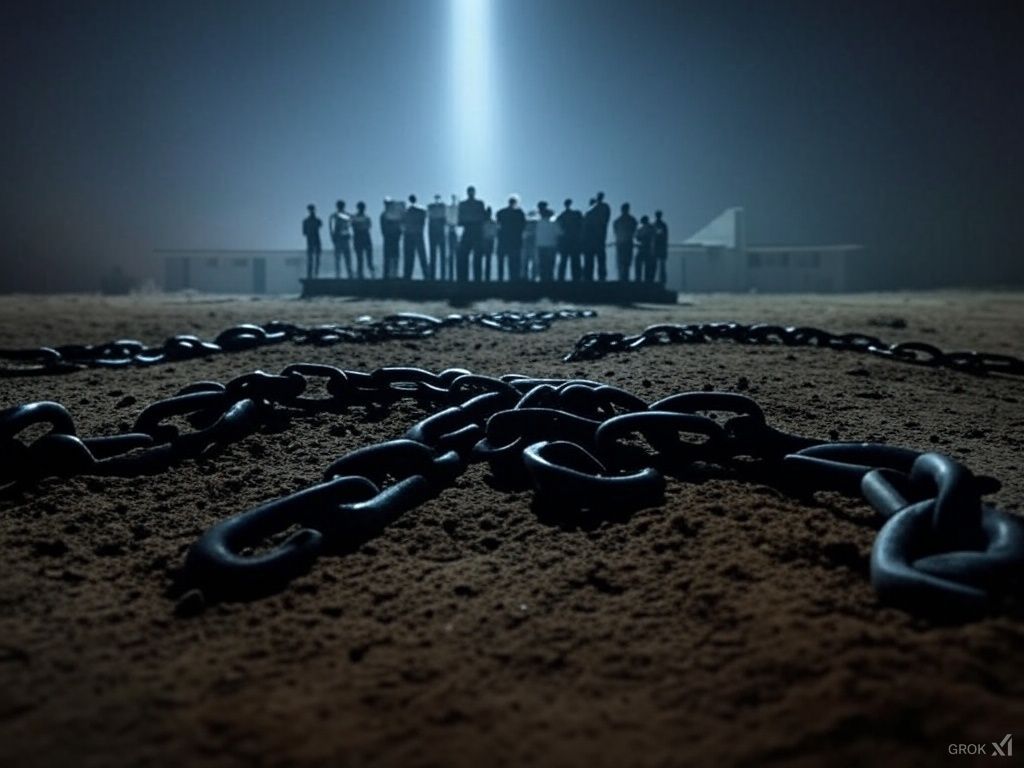Fresh Multimedia

Unmasking the Hidden Prison: The Preacher’s Wife on Civil Commitment

The Return of The Preacher’s Wife Blog
Introduction by Joshua T. Berglan
It is with profound privilege and a deep sense of purpose that I present the return of The Preacher’s Wife blog. Writing from the unique perspective of a wife whose husband has been civilly committed, The Preacher’s Wife sheds light on an aspect of our legal system often ignored, misunderstood, and deeply stigmatized. Her voice is one of resilience, faith, and unwavering determination, as she shares her journey not only as a wife but as a cancer survivor who continues to fight for justice and truth.
For those unfamiliar, civil commitment is a legal process by which individuals are detained under the premise of potential future danger, often without having been charged or convicted of any crime. While this practice encompasses various forms—including guardianships like Britney Spears’ conservatorship —it also includes facilities like the Texas Civil Commitment Center. Here, individuals accused of unspeakable offenses are indefinitely detained, many having already served their sentences or, disturbingly, without ever having been convicted.
My own journey with civil commitment advocacy began over three years ago when I encountered someone who had been falsely accused and endured the loss of freedom and reputation despite ultimately proving his innocence. Since then, I have conducted over 40 interviews with men across the country who are living in these so-called rehabilitation facilities. What I have uncovered is a harrowing and inhumane system rife with abuse, corruption, and injustice— affecting not only the detained but their families as well.
Today, I am honored to resume publishing this critical content. While my personal health battles—including tremors that began during an interview on this very topic—have slowed my work, they have not diminished my passion for shining a light on these injustices. I invite you to read The Preacher’s Wife ’s latest blog, which paints a vivid and heart-wrenching picture of one such facility in Texas.
– Joshua Tyler Berglan
About The Preacher’s Wife
The Preacher’s Wife is more than just a pen name; it represents the lived reality of a woman whose husband has been indefinitely detained under civil commitment in Texas. A devoted wife and fierce advocate, she writes from the depths of personal experience, offering a rare glimpse into the heartbreak, resilience, and faith required to navigate the labyrinth of injustice surrounding civil commitment.
"Through her writing, The Preacher’s Wife highlights the human cost of this shadow legal system, offering a rare glimpse into the heartbreak, resilience, and faith required to navigate its labyrinth of injustice."
Texas Prison Hiding as a Rehabilitation Center
Where does punishment end and abuse begin? How does an observer determine where the punishment stops, and the abuse starts?

On the vast expanse of the barren northwestern prairie of Texas, in what was once a farming area, sits a former juvenile detention center. This facility was closed due to staff abuse of juveniles. It now operates under the guise of a rehabilitation hospital but functions as a full-fledged prison. The unattractive, mismatched buildings are located down a county road, situated in a pasture, and surrounded by two rows of fences topped with razor wire, patrolled by armed security guards. Inside, security personnel wear prison-style uniforms. New prefab buildings are being erected to accommodate an influx of new men arriving at the unit. These structures belong to a private, for-profit prison company that purchased the land and existing buildings, thereby gaining full control over security and establishing all security rules through their administrative staff and policymakers. This prison operates at the expense of Texas taxpayers, yet most Texans are unaware of its location or purpose.
This shadow prison is monitored by a third-party vendor with an overseer office established by the Texas Legislature, tasked with supervising the vendor’s governance. A constant power struggle exists between the two entities regarding the enforcement and interpretation of court rules. The overseer’s office is located at least 400 miles from the unit, with no representative stationed at the facility or in the city of Littlefield. The Director and her staff make infrequent trips to the unit.
The remote location limits the ability of family, friends, and loved ones to visit and makes it difficult to find attorneys willing to travel to handle any cases the residents may have. The nearest airport, in Lubbock, offers only limited daily flights.
Living Conditions and Legal Challenges
The men housed here have completed court-ordered sentences in the state prison system and have no pending criminal charges. Upon their release date, often just a week before or on the day of release, these men are served with a subpoena for a court hearing requested by the state to commit them to the Texas State Civil Commitment Center. The state provides an attorney if the defendant cannot afford one. State prosecutors present testimony from state-paid psychiatrists who assert that these men “may reoffend at some time during the rest of their life,” a statement used in all civil commitment trials. This is akin to saying that one may win the lottery at some point if they live long enough. Few men at these hearings avoid indefinite confinement at the civil commitment center.
These men are labeled as the worst of the worst predatory sex offenders. The Texas Civil Commitment Center is akin to a place where the most violent and detested individuals are confined indefinitely, with no clear path for release other than paying substantial fees to attorneys and courts to challenge the state’s decision.
The facility is located within the city limits of Littlefield, Texas, a small community 32 miles northwest of Lubbock with a 2023 population of 5,768. Ironically, this unit has faced lawsuits alleging abuse of residents, similar to the previous detention center. The commitment center is a major industry for Littlefield, a community traditionally built around cotton farming and ranching. Due to the facility’s isolation, there are only two motels in town with high rates; the alternative is to stay in Lubbock. Quality restaurants are also scarce.
Therapy and Support Services
Court rules mandate that the men receive individual sex offender therapy and support groups, but this does not always occur. The turnover rate for case managers and therapists is high. Many therapists are trainees attending school in Lubbock, supervised by a licensed therapist in Austin, approximately 400 miles away, who seldom visits the unit. There is also significant turnover among security officers, who receive minimal training and often lack work experience. When a therapist is unavailable, men must start over with a new therapist, and therapy sessions are often canceled, leaving men unprepared for group sessions.
The court-ordered exit plan includes four tiers of advancement, with the fourth tier being the exit tier. However, the vendor and monitor have added a fifth tier, making it rare for men to reach it. Those who do reach the exit tier and are allowed into the community remain on probation, with no true release from civil commitment. Probation officers are hired by the Director’s office, not the state, and enforce stringent rules: windows must be covered with dark curtains, no pets or specific electronics are allowed, and friends may not visit without permission. There are curfew, living location, phone, and shopping restrictions, and men must wear ankle monitors.
Communication and Visitor Restrictions
Men may wear civilian clothing if provided by family and friends at their expense. To supply a resident with packages or funds, a 25% surcharge is applied. If sending a package, a receipt must be provided, and 25% of the receipt’s value included before the resident may receive it.
Although not officially inmates, security guards and staff often refer to the men as such, exhibiting arrogance and disrespect. Case managers have threatened to demote men to lower tiers, stripping them of privileges. Staff have also shown similar attitudes toward family members and visitors. Visitors must be vetted and sign a contract with strict rules; any infraction can lead to revoked visitation rights. Defending a resident can result in severe retaliation, including demotion to tier one, loss of privileges, and solitary confinement, despite state prohibitions against it.
Privacy and Monitoring
Residents must undergo annual polygraph and penile plethysmograph (PPG) tests, the latter being humiliating and not accepted in courts. Testers may manipulate results to suggest lack of progress in therapy.
Basic Amenities and Quality of Life
Meals have been reduced to child-sized portions, leaving many men hungry. There is no dining room; trays are brought to common areas, and if seating is insufficient, residents eat in their cells. No creative programs are provided; other than a gym and TV, there is nothing for entertainment. Residents have to depend on their electronic equipment. A book may be sent to a resident once a month.
Recent Incidents and System Flaws
The most recent occurrence of nonsense was a total lockout of the world from the unit. All visits were canceled, the phones were turned off, and mail was stopped from coming in or going out. Outside phone calls were answered with a, “You will have to talk to a supervisor, and they are all in a meeting.” This lasted for a week. Those who called or heard from a resident learned that the story was that contraband was found, and several residents were removed from tier four and placed in tier two. Residents have been informed that, starting in January, all phone calls will be recorded.
The unit equipment cannot distinguish between speaker phone, three-way calling, or being placed on hold. Because of this lack of ability, if it is thought that a three-way calling has taken place, then all contact will be removed from the resident and whoever they were speaking with.
Disrespect and Vending Machine Issues
Flagrant disrespect even takes place in the visiting room. The vending machines will take coins or paper money for payment but not drop the purchase. The vending machine company has yet to reimburse any of the people who lost their money. Use of the machine will only work by using a credit or debit card. The price of the product in the machines far outweighs the price of the local retail stores and grocery stores.
Poor Medical Care
The most abusive element the operating company performs is the poor medical care. Few men are given appropriate medical care without the intervention of outside assistance. To receive medical care may involve the use of an attorney, calls to the director, and even law enforcement. In the past year, there was an incident where a resident went to the medical clinic complaining of chest pains. He was told to go to his house and was given Tylenol. He was found dead of a heart attack a few hours later.
Strict and Unclear Rules
Prison rules are numerous and difficult to interpret correctly and then behave accordingly. Staff scrutinizes all actions and words, looking for an excuse to initiate and instigate an incident with the resident.
Closing Remarks
As we publish this blog, I remain steadfast in my commitment to advocating for those silenced by civil commitment. Thank you for supporting The Preacher’s Wife as she courageously continues her work. Together, we can bring these hidden injustices into the light.
– Joshua Tyler Berglan
Thank you for reading..
'Preacher Wife'
Call to Action
This piece serves as a call to action. The injustice of civil commitment is a stain on the legal system that must be confronted. The Preacher’s Wife invites you into her world, urging us all to examine the humanity—or lack thereof—in this broken system.

Latest Insights and Trends: Explore Our Recent Blogs
The World's Mayor Experience Fresh Multimedia




















